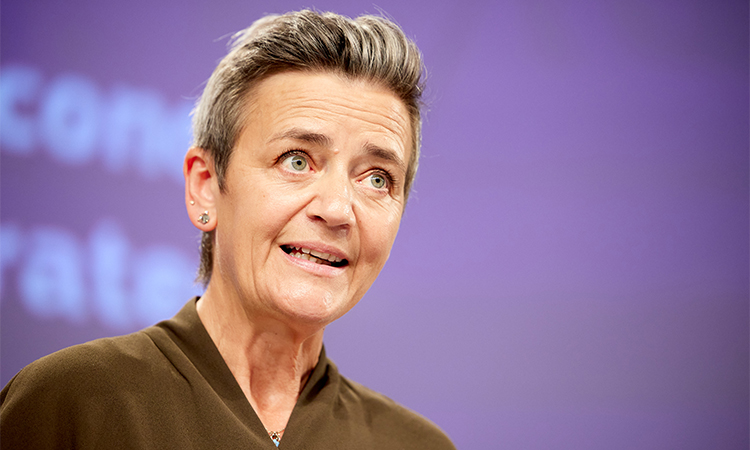The European Union needs to “show boys and girls” that leadership means men and women “leading together,” Vestager said.
Outgoing European Commissioner Margrethe Vestager has denounced EU governments for undermining Ursula von der Leyen’s efforts to appoint a gender-balanced ‘college’ of Commissioners responsible for steering the EU’s powerful executive.
Capitals have flouted von der Leyen’s explicit request for both a male and female candidate to form part of her next executive, in order to provide her leeway in striking the right gender balance.
“Unfortunately it’s a de-masking of the lack of efforts when it comes to equal opportunities and gender balance,” Vestager, who has built a reputation for herself as a heavyweight over her decade as European Commissioner, told Euronews in an interview on Monday.
She spoke hours after the final Commissioner nomination came in from Belgium, which has put forth foreign minister Hadja Lahbib.
“Ursula von der Leyen asked a completely legitimate thing: give me two candidates, a man and a woman, then I will compose my Commission so it’s gender-balanced and so that people have the competencies needed,” Vestager added. “I think it’s really a pity that member states do not follow through.”
Von der Leyen made her request for two names, representing both genders, to capitals shortly after her re-election as Commission chief was confirmed in July.
Of the 25 member states that had been asked to put forth candidates, only one country – Bulgaria – has heeded von der Leyen’s request by nominating two hopefuls.
Just eight of those countries have put forth female candidates, meaning that only ten (37%) of the names pencilled in to form the next executive are women. They include von der Leyen herself, who represents Germany as president, and Estonia’s Kaja Kallas, nominated by EU leaders back in June to become the next EU High Representative for Foreign Policy.
Von der Leyen is expected to hand out policy portfolios to the candidates over the coming weeks. They will then have to undergo a hearing before the European Parliament as well as a confirmation vote before they can be installed in their respective roles.
Von der Leyen is reportedly making last-ditch efforts to convince some member states to switch their male nominees for women, offering a more attractive policy portfolio for those that abide by that request. Romania became the first country to switch its nominee on Monday, fielding MEP Roxana Mînzatu and retracting Victor Negrescu.
‘We were making progress’
Vestager, who has served as Denmark’s EU Commissioner for two consecutive five-year terms, has built a reputation as Brussels’ antitrust tsar, slapping hefty fines on the world’s biggest companies for abusing their market dominance.
She has also become a thorn in Big Tech’s side, helping spearhead the bloc’s ground-breaking digital rulebook – the Digital Services Act – and the world’s first regulation aimed at placing guardrails on AI technology.
Her feats saw her make TIME magazine’s list of the world’s 100 most influential people in 2023.
She told Euronews she laments the failure to ensure sufficient female nominees as a setback in the EU executive’s efforts is showing that a gender-balanced Commission is “capable of doing unprecedented work.”
“It’s just a simple act of fairness that both genders should be taking part in leadership,” Vestager said.
“You need all the talent that you can have, and you also need different life experiences to be reflected in the Commission,” she added. “And you need to show boys and girls that this is what leadership looks like: men and women leading together.”
Vestager left the door open to a return to public life after her decades-long mandate ends in the autumn.
She told Euronews that she hopes her “ambitions” for Europe can still “find an outlet” after she leaves the EU executive, which places stringent post-mandate restrictions to avoid revolving doors.
“I think the geopolitics of this world is something that should encourage Europe to be much more engaged with the world around us,” she said, “so there are plenty of things that I would love to work with.”


